SpyFu: The Premier SEO & PPC Tool to beat Your Competitors
Written by Mousume Akter | Published on May 30, 2025

Let’s be honest,keeping up with SEO and paid advertising often feels like running on a treadmill that keeps accelerating. Just when you think you’ve cracked the algorithm, Google changes the rules. Meanwhile, your competitors seem to always be one step ahead, ranking higher and running ads that convert.
What if you could look behind the curtain and discover exactly what’s working for them?
That’s where SpyFu comes in.
If you’re aiming to grow your online presence, chances are you’ve heard about SpyFu. But what exactly is SpyFu, and how can it help you outperform your competition in search results? Whether you’re new to digital marketing or seeking to elevate your strategy, this guide will walk you through the evolution and history of SpyFu and how to use it effectively in 2025.
SpyFu was launched in 2005 as a way to uncover competitor keyword strategies. Initially, it focused mainly on SEO data, but later added more tools for PPC campaign analysis.
Over the years, it expanded features to include backlink tracking, domain comparison tools, and keyword grouping. These additions improved how users could analyze and act on data.
It remains popular among digital marketers because it combines SEO and PPC data in one place. Its updates focus on maintaining relevant information as search engines like Google change their algorithms. This makes SpyFu a reliable choice for ongoing marketing research.
In this guide, you’ll learn everything you need to know about SpyFu, what it is, how it works, and how you can leverage it to gain a competitive edge in 2025.
What Is SpyFu?
SpyFu is a powerful SEO and PPC research tool that gives you a behind-the-scenes look at your competitors’ marketing strategies. Want to know what keywords your competitors are ranking for? Curious how much they’re spending on Google Ads? SpyFu has the answers.
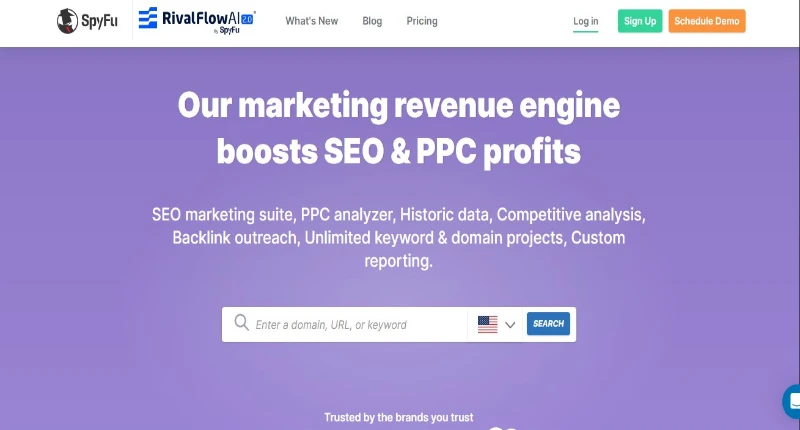
At its core, SpyFu helps you:
- Discover profitable keywords
- Analyze your competitors’ SEO and PPC strategies
- Track your keyword rankings
- Uncover backlink opportunities
- Optimize both organic and paid campaigns
Whether you’re running a blog, managing a company website, or leading a full-scale digital marketing team, SpyFu has tools designed to simplify and supercharge your marketing efforts.
SpyFu Setup Guide
Getting started with SpyFu is incredibly simple.
After creating your account, just log in and click on “Create a Project.”
Next, enter your domain along with a display name for the project.
SpyFu will then recommend some competitors for you to consider.
You can choose whether to include these competitors in your campaign or not.
Once you’ve made your selection, your project setup is complete and ready to use.
SpyFu’s User Interface and Experience
Personally, I really dislike complicated or outdated interfaces.
Luckily, SpyFu’s dashboard is designed with simplicity and clarity in mind.
At the top of the dashboard, you’ll find six tabs that give quick access to features like keyword research, SEO research, PPC research, and AI tools,all of which I’ll explain in this guide.
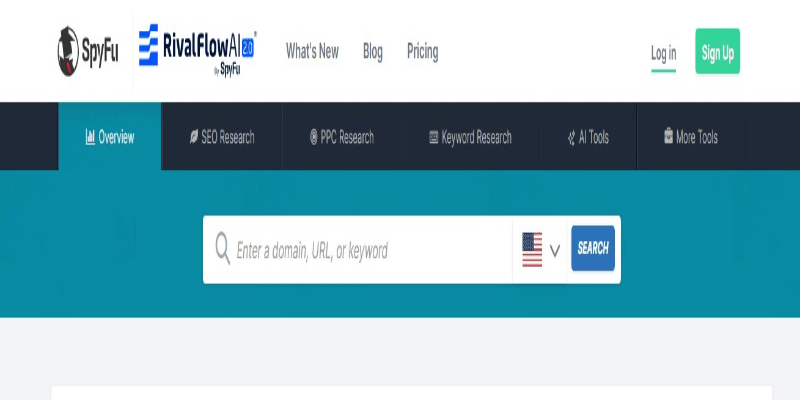
The search bar is positioned right in the center of the dashboard, making it quick and easy to get an overview of your domain.
You can also use it to search for keywords or specific URLs, depending on the tool you’re using. Plus, you can adjust your region settings to ensure the data matches your target audience.
SEO Research
One of SpyFu’s standout features is its extensive competitor and PPC analysis tools.
But before diving into those, let’s first explore the broader set of tools available under SpyFu’s SEO Research tab.
SEO Overview
The SEO Overview page is divided into several sections that give you a quick snapshot of your most important data. These include:
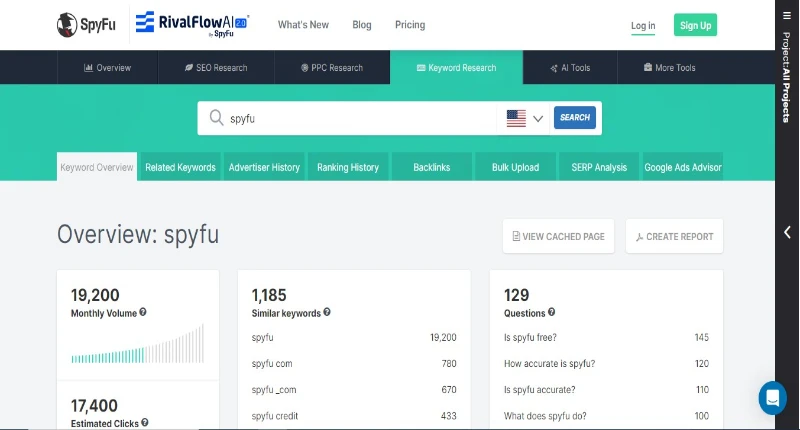
- Top organic competitors
- Shared organic keywords across all your competitors
- Performance metrics for your keywords
- A brief overview of your backlinks and top-performing pages
- A summary of your keyword ranking history
At the very top, you’ll instantly see the total number of organic keywords linked to your site or your competitors’ sites.
You’ll also find estimates of your total organic clicks and the approximate value of your organic traffic.
To explore the data in more detail, simply click on any section.
For instance, if you want to review your inbound links or track keywords that have significantly improved or dropped in rankings, just select the relevant section.
This will open a new page with deeper insights and detailed data.
Competitor Analysis
SpyFu allows you to identify your closest organic competitors and examine their SEO strategies in detail.
(There’s also the option to analyze PPC competitors, which we’ll cover later.)
This is done through the Competitors tab, where you can see the top competitors ranking for the same organic keywords as your site.
You’ll also find data on their estimated monthly clicks and the monetary value of those clicks.
The graph displayed helps you compare how your competitors’ progress stacks up against your own site’s growth.
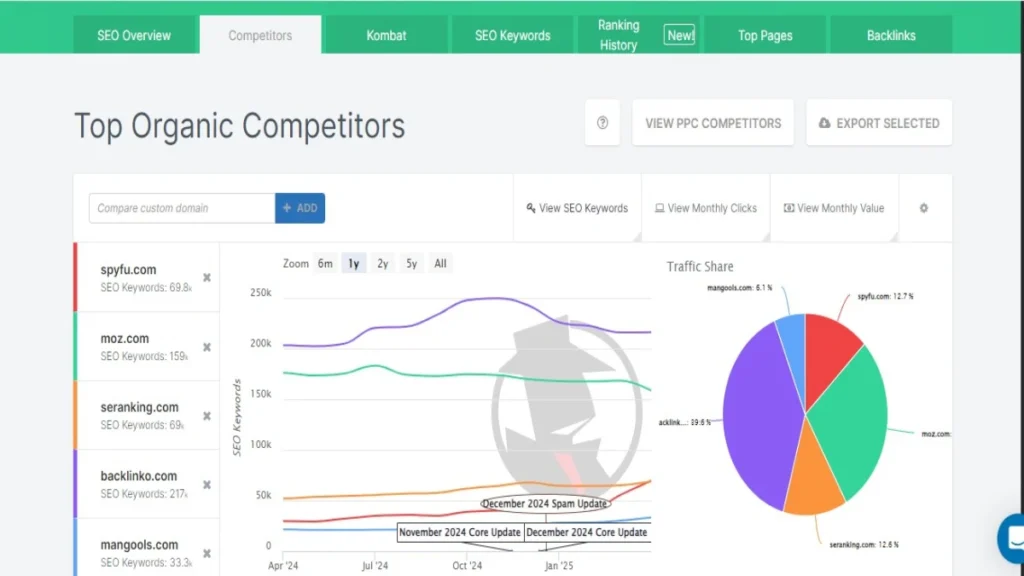
Below the graph, a detailed list of competitors is shown, accompanied by several key metrics SpyFu uses to rank your top rivals. These metrics include:
- Overlap: Shows how many organic keywords you share with a competitor, giving insight into your direct competition.
- Common Keywords: Highlights the number of keywords both you and your competitors are targeting, helping identify areas of shared focus.
- Number of Keywords: Represents the total organic keywords SpyFu has found for a given domain.
- Monthly Clicks: An estimate of the total clicks a domain receives from all its organic keywords each month.
- Monthly Value of Clicks: SpyFu’s estimated monetary value of the clicks generated from those organic keywords, giving a sense of their potential worth.
Kombat for SEO
One of SpyFu’s most valuable features is the Kombat tool.
It compares your domain directly against your competitors using a Venn diagram, giving you a clear visual of shared and unique keywords.
You can either use the competitors SpyFu recommends or add your own.
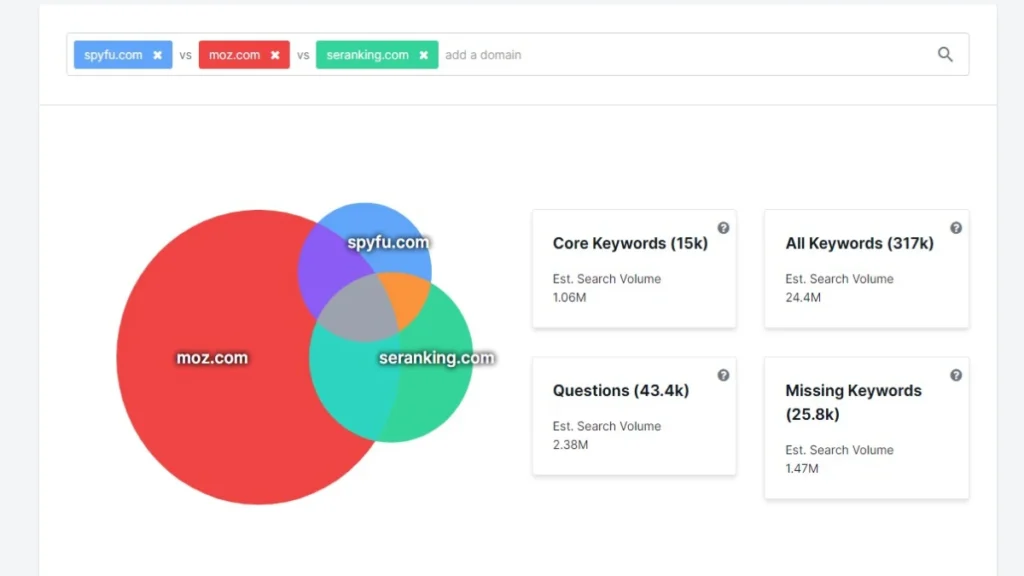
The tool categorizes keywords into four groups:
- Core Keywords: Keywords that all compared domains rank for.
- All Keywords: Any keywords that at least one of the domains is targeting.
- Questions: Keywords that appear as search queries related to any of the domains.
- Missing Keywords: Keywords your competitors are targeting but you are not.
This tool is similar to Semrush’s Keyword Gap feature. However, Semrush’s version includes an “Untapped” filter, which reveals keywords ranked by any competitor—not only those all competitors share—highlighting more potential keyword opportunities.
What stands out about SpyFu’s Kombat, though, is its unique column showing the percentage of users who leave the search results page without clicking on any results for each keyword.
This helps you identify keywords unlikely to drive much traffic, so you can avoid wasting time on low-value targets and focus on high-impact keywords.
Finding High-Value Keywords
SpyFu offers useful filters, located on the left side of the Kombat page, to tailor your keyword research.
You can exclude your own domain’s keywords and filter by:
- Search volume
- Keyword difficulty
- Mobile vs. desktop search percentage
- Percentage of searches without clicks
- And more
You can also include or exclude specific keywords, which helps remove branded terms from your results.
Next to the filters, you’ll find the Topics option, which groups keywords by their parent topic.
This is great for generating content ideas clustered around specific themes.
Once you identify keywords you want to target, you can select and export them for deeper analysis.
SEO Keywords
The SEO Keywords tool lets you closely examine both your own and your competitors’ keyword rankings.
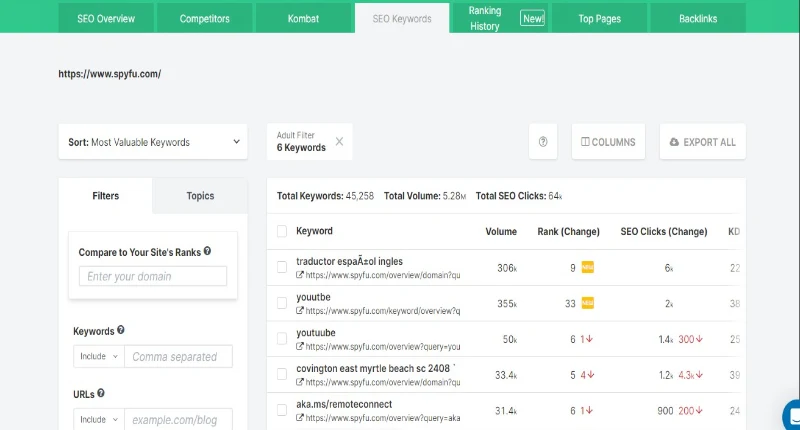
Once you enter a domain, SpyFu provides a comprehensive list of keywords along with five important metrics:
- Volume
- Rank (Change)
- SEO Clicks (Change)
- Keyword Difficulty (KD)
- Cost Per Click (CPC)
You can customize which columns appear using the “Columns” button.
Two key metrics to focus on are Rank (Change) and SEO Clicks (Change):
Rank (Change):
- Rank shows your current position in search results for a keyword.
- Change indicates how many positions your ranking has moved since the last update, whether up or down.
SEO Clicks (Change):
- SEO Clicks estimates the number of organic clicks a page should receive monthly based on its current rank.
- Change compares your current SEO clicks to the previous period, showing whether clicks have increased or decreased.
For example, if a page for “Google Trends” has moved up three spots to rank 13, SpyFu might estimate it’s now getting 1,500 more clicks per month.
Ranking History
The Ranking History tool allows you to monitor how your keyword rankings—and those of your competitors—have changed over a selected time period.
You can customize how the results are sorted; for example, you might choose to see the keywords with the biggest rank improvements first.
You can also focus on specific keywords or narrow your search by filtering keywords into categories or topics.
This way, you get a clear view of where keywords ranked at the beginning of the period compared to where they stand now.
For instance, the keyword “content marketing plan” might have climbed 87 positions over the past year, moving from rank 93 up to position 6.
This kind of data helps you analyze the factors behind your ranking gains—whether it’s the result of acquiring quality backlinks, optimizing content, or other SEO efforts.
By leveraging this tool, you can identify which strategies have worked well, then apply those tactics across your other content to continue boosting your search rankings.
Top Pages
When doing competitor research, it’s crucial to identify which keywords are generating significant traffic.
SpyFu’s Top Pages feature makes this easy.
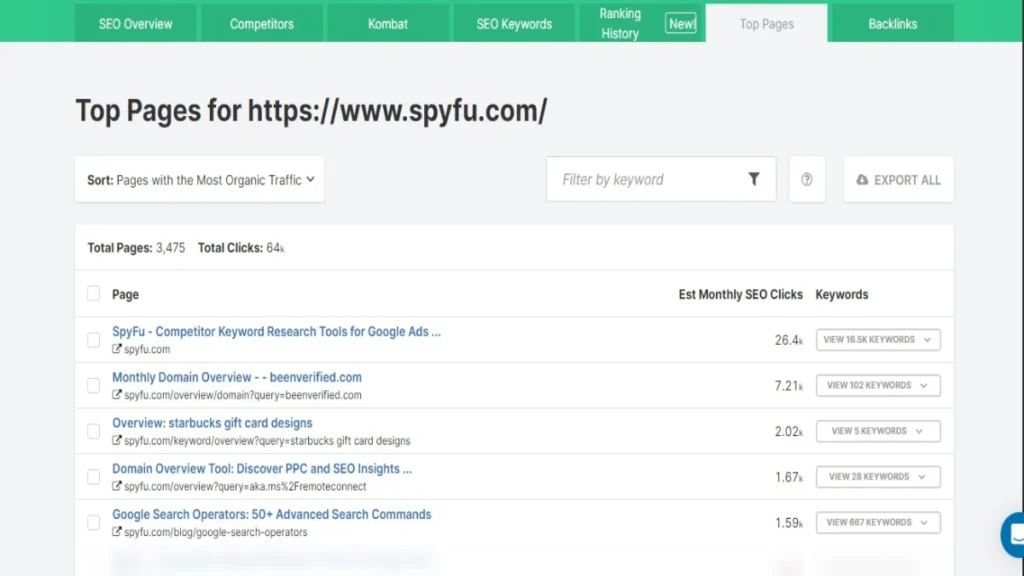
This tool shows which pages on both your site and your competitors’ sites are attracting the most organic traffic.
If certain pages on your site perform well, consider creating additional content related to those topics.
When reviewing competitors, take note of the pages driving the most traffic to their sites.
Do you have content covering those topics? If not, these are areas you should consider targeting.
The tool highlights competitors’ top-performing pages based on estimated organic clicks from search engine results pages (SERPs) and shows the keywords those pages rank for.
By default, it lists pages with the highest organic traffic, but you can also sort by “New Pages” to spot recent content gains.
Using the keyword filter, you can narrow results to focus on specific keywords relevant to your goals.
You’ll then see a ranked list of pages with estimated monthly clicks.
Additionally, the tool provides details on the keywords each page ranks for, along with valuable metrics such as:
- Ranking position
- Search volume
- Estimated SEO clicks
- Keyword difficulty
- Organic clicks
- “Not clicked” rate (how often users don’t click any results)
Backlink Analysis and Link Building
SpyFu takes a unique approach to link building compared to many other SEO tools.
Its focus is on helping you discover valuable backlinks that can boost your rankings for your target keywords. You can also explore which websites link to your domain or your competitors for specific keywords.
There are multiple ways to use this feature. You can start by entering keywords relevant to your site that you want backlinks for.
SpyFu then generates a list of pages where obtaining backlinks could help improve your rankings for those keywords.
You can also input a domain along with a keyword to identify which sites are already linking to that domain for that specific term.
For example, if you enter “local SEO,” SpyFu will show sites linking to your chosen domain around this keyword. You can filter these results by page types such as:
- Blogs
- .GOV/.EDU sites
- Pages with affiliate links
- News sites
- Forums
- Directories
This helps you narrow down backlink opportunities to relevant sources.
However, some of these pages might not be closely related to the exact keyword you’re targeting, since SpyFu’s method is based on links that may contribute to ranking for the term, not necessarily links containing the keyword itself.
When you hover over the “Outbound Links” metric, you can see other sites that these linking pages also point to, giving you insight into the broader link network.
The Backlink Kombat tool offers even more targeted insights. It lets you identify pages that link to your competitors but not to you, while allowing you to exclude your own domain from the results.
This is a great way to find relevant sites that could be new backlink opportunities.
Overall, SpyFu’s backlink tool is useful for quickly identifying potential backlink sources. However, it’s not built for comprehensive backlink audits like some other platforms (e.g., Semrush, which provides a dedicated Backlink Audit tool).
SpyFu also includes helpful link-building features like the outreach tool under the Backlinks tab, which helps you find contact information for people who manage the sites you want backlinks from.
This makes it easier to organize your outreach efforts and start conversations that can lead to valuable links.
SEO Reports
The SEO Reports feature is ideal for consolidating all your SEO data in one convenient location.
It’s especially useful for presenting clear progress updates to clients, showcasing the results of your SEO efforts on their websites.
SpyFu’s reports provide a comprehensive breakdown of all the SEO insights available within the platform.
You can schedule these reports to be delivered monthly, enabling you to monitor progress over time and keep clients consistently informed with up-to-date performance data.
PPC Research
SpyFu is just as powerful when it comes to PPC research—arguably even more so than for SEO.
The platform offers a wide range of competitive analysis tools designed to help you gain a deep understanding of what’s driving success for your paid search competitors.
With SpyFu, you can uncover valuable insights to optimize your own PPC campaigns by learning from your rivals’ strategies.
PPC Overview
The PPC Overview gives you a comprehensive snapshot of your own paid search campaigns, while also allowing you to analyze your competitors’ PPC strategies.
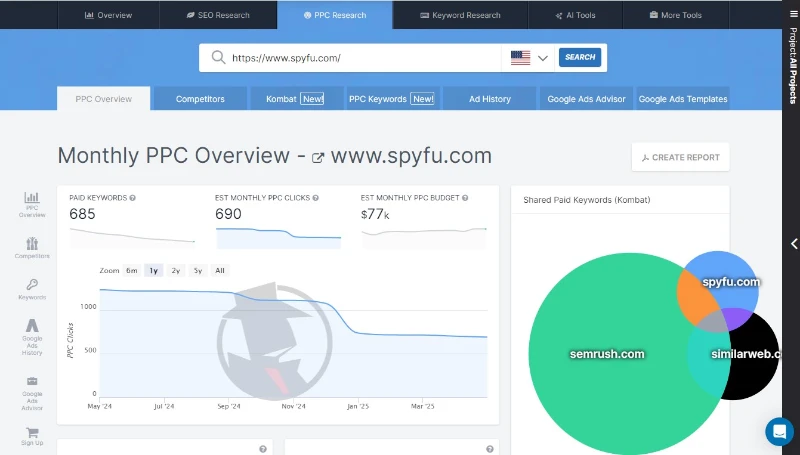
Simply enter any domain into the search bar at the top, and SpyFu instantly generates detailed data including:
- Estimated monthly PPC clicks
- Estimated monthly PPC budget
- Paid keywords
- Google Ads buy recommendations
As you scroll down, you’ll find a list of the highest-performing paid keywords, complete with useful metrics such as monthly cost, search volume, and paid clicks.
- Monthly Cost: The estimated amount an advertiser spends each month to bid on and run ads for a particular keyword.
- Search Volume: The total number of searches performed for that keyword in the last month.
- Paid Clicks: The percentage of total clicks on the search results page that go to paid ads for that keyword.
Paid clicks typically drive users directly to the advertiser’s landing page, increasing brand exposure and chances for conversions.
By studying these metrics, you can uncover valuable insights into your competitors’ paid advertising tactics. Knowing which keywords they target, how much they spend, and how popular those keywords are empowers you to make smarter, data-driven decisions for your own PPC campaigns.
PPC Competitor Analysis
The PPC Competitor Analysis tool functions similarly to SEO competitor tools by revealing who your main paid search rivals are. It presents this data visually in a graph format, allowing you to switch views between competitors’ PPC keywords, paid clicks, and advertising budgets.
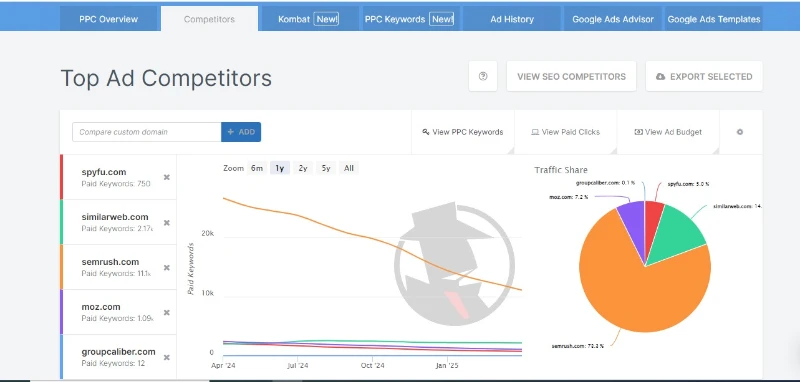
By examining the graph, you can spot trends in your competitors’ paid campaigns, such as when they increased or decreased their spending, or when their campaigns started gaining traction or losing effectiveness.
Underneath the graph, a table lists the overlapping keywords among your competitors, highlighting the common search terms they’re bidding on. This helps you understand which keywords are considered valuable in your market and how competitive those terms might be.
PPC Kombat Tool
This tool offers deeper insights into which keywords your rivals are actively targeting. It also identifies “Potential Ad Waste”, keywords you’re targeting that your competitors are ignoring. While this can indicate wasted budget on low-traffic keywords, if those terms convert well for you, they might still be worth keeping.
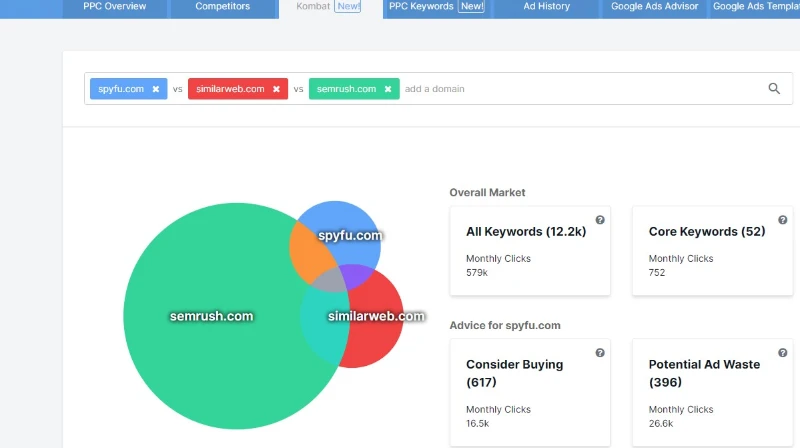
Additionally, the tool recommends keywords under the “Consider Buying” filter, suggesting terms that could be beneficial to add to your campaign. The tool shows search volume and the number of advertisers bidding on each keyword. Keywords purchased by multiple competitors likely have good potential, while those only bought by one might be niche or brand-specific tests.
PPC Keywords Tool
This tool lets you analyze your competitors’ paid keywords in greater detail. You can input your competitor’s domain and add your own to exclude keywords you already bid on. This saves time and helps you focus on new opportunities.
Keywords are grouped into related clusters for easier analysis, enabling you to spot overall patterns and trends. Filters let you sort by search volume, keyword count, or focus on “Most Successful” or “New Keywords,” helping you stay ahead of the competition with the latest terms they’re targeting.
Hovering over the “Ads” column reveals how many competitors bid on a keyword and which domains they are, while the “Ad Copy” section shows the most recent ad copy used for that keyword, including headlines, display URLs, and positions.
Ad History Tool
SpyFu keeps a historical record of all ads run by a domain. This tool lets you review your competitors’ past ad copy and track changes over time. Ads are color-coded to indicate how long a particular version ran, and changes show when new copy replaced old.
You can filter ads by keyword and see key performance metrics like:
- Percentage of ads served using that copy
- How often did the ad appear at the top of search results
- Average position compared to competitors
This helps you identify high-performing ad copy that you can adapt for your own campaigns.
Google Ads Advisor
The Google Ads Advisor offers keyword recommendations based on multiple factors such as competitor interest, search volume, and cost per click (CPC). After entering your domain, it suggests keywords to buy, rates them as “Great Buy” or “Good Buy,” and flags keywords to avoid with a “Negative Match” option—helping you allocate budget wisely.
Google Ads Templates
SpyFu provides ready-to-use Google Ads templates tailored to specific industries. These templates can be quickly imported into your Google Ads account, helping you launch campaigns faster. If your industry isn’t covered, you can request a custom template.
Keyword Research
SpyFu’s keyword research tools give comprehensive data for both organic and paid keywords.
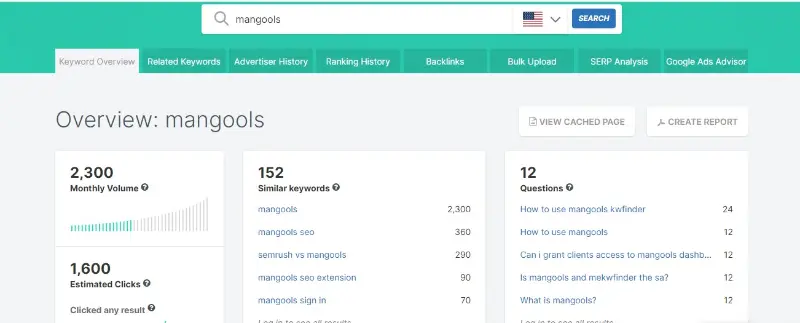
- Keyword Overview: Offers detailed data on a keyword’s PPC recommendations, top advertisers, organic rankings, and current ads.
- Related Keywords: Finds similar keywords with metrics like search volume, difficulty, and CPC. You can filter and group keywords by questions or topics to enrich your content.
- Advertiser History: Tracks competitors’ ad budgets, keyword counts, average ad positions, and top page percentages for specific keywords, showing different versions of their ad copy.
- Ranking History: Displays organic ranking trends of your competitors for selected keywords, highlighting who’s improving or losing ground.
- Bulk Upload: Upload up to 1,000 keywords at once to get metrics like search volume, difficulty, clicks, and CPC.
SERP Analysis
This tool analyzes search engine results pages (SERPs) for any keyword, showing:
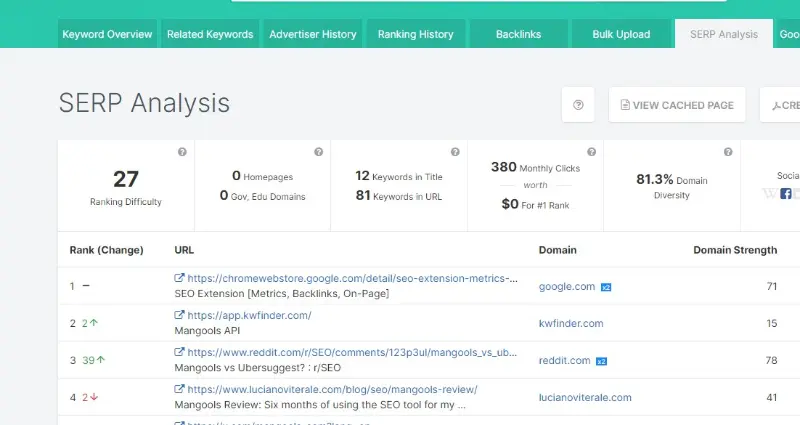
- Difficulty to rank
- Number of authoritative domains
- Keyword usage in titles and URLs
- Expected monthly clicks and traffic value
- Diversity of domains ranking
- Presence of social media or Wikipedia results
- Current ads on the SERP
By studying this, you can better understand what it takes to rank and where ads are placed.
List Builder
SpyFu offers tools to build lists of top domains or keywords:
- Domain Top Lists: Ranks domains by metrics like organic traffic or ad spend. You can filter by industry or location and export the data.
- Keyword Top Lists: Shows lists of keywords with the highest CPCs or traffic to identify valuable targets.
- Custom Lists: You can request tailored lists with combined organic and paid stats relevant to your niche and goals.
SpyFu Pricing Plans
SpyFu offers two main subscription options, plus a limited free account for basic use:
| Feature | Basic Plan | Professional Plan |
| Monthly Price | $39/month | $79/month |
| Annual Price (per month) | $33/month | $58/month |
| Search Results Rows | 10,000 | Unlimited |
| Data Exports Rows | 10,000 | Unlimited |
| Domain Overview PDFs | 100 | Unlimited |
| Historical Data | 6 months | 10+ years |
| Sales Leads & Contacts | 250 | 500 |
| Weekly Keyword Tracking | 5,000 keywords | 15,000 keywords |
| API Access | Not included | Included |
How SpyFu Compares to Other SEO Tools
I’m a big fan of SpyFu, but it’s not the only option out there. Let’s see how it stacks up against some major competitors.
SpyFu vs. Semrush
Semrush is a bit pricier but offers a broader set of features. If you want a tool that covers SEO, paid advertising, and content marketing all in one, Semrush is a great choice. SpyFu, meanwhile, is ideal if your focus is mainly on keyword research and competitive analysis without much emphasis on backlink tracking.
Semrush’s Pro plan costs around $140/month, whereas SpyFu’s Professional tier is $79/month. For deep site audits, traffic analysis, and keyword tracking, Semrush may justify the higher price.
SpyFu vs. Ahrefs
Ahrefs is well-known for its strong backlink analysis tools, which SpyFu lacks. However, SpyFu shines when it comes to researching competitors’ paid ads. Ahrefs starts at $99/month, making SpyFu’s $39/month plan a more budget-friendly option if backlink auditing is not your priority.
SpyFu vs. Serpstat
Serpstat is a decent tool but doesn’t quite match the power of Semrush or Ahrefs. If your main needs are competitive analysis and keyword research, SpyFu should meet them. For users who want SEO audits alongside backlink tools, Serpstat, at $59/month, might be preferable.
Pros and Cons of SpyFu
Pros:
- Offers a wide range of useful SEO and PPC tools
- More affordable compared to many competitors
- Detailed competitor insights
- Effective for both organic SEO and paid ad research
- Boosts your keyword research capabilities
Cons:
- No built-in SEO site audit feature
- It can feel overwhelming to beginners due to many features
- Some tools have a learning curve
- Lacks backlink auditing functionality
FAQs
1. How often is SpyFu’s data updated?
SpyFu updates its data regularly, usually every week. This helps ensure you get the latest insights into keyword trends, competitor activities, and ad campaigns. However, keep in mind that some data, especially estimated figures, may have a slight delay or margin of error.
2. Can SpyFu help with local SEO?
Yes, SpyFu includes features that help you analyze local search performance and track keywords by location. This makes it a useful tool for businesses targeting specific geographic areas, although it may not be as comprehensive as tools dedicated solely to local SEO.
3. Does SpyFu provide competitor backlink analysis?
SpyFu offers limited backlink information but does not provide full backlink auditing features. If backlink analysis is a priority for your SEO strategy, you might want to complement SpyFu with specialized backlink tools like Ahrefs or Moz.
4. Is SpyFu suitable for beginners in SEO?
SpyFu has a wide range of powerful tools, which can be overwhelming for SEO beginners. However, it provides a user-friendly interface and plenty of tutorials to help new users get started. If you’re new to SEO, some time investment will be needed to master all its features.
5. What kind of customer support does SpyFu offer?
SpyFu provides customer support via email and an extensive knowledge base with tutorials, FAQs, and guides. They do not currently offer live chat or phone support, so most help is delivered asynchronously
Is SpyFu the Right SEO Tool for You?
If you want a simple way to see what your competitors are doing,like their top keywords and ad strategies,SpyFu is a solid choice. It’s affordable and combines SEO and PPC insights in one place, making it perfect for marketers and small businesses who want results without the hassle.
For deep technical SEO audits, you might need extra tools, but if your goal is to get smarter about your keywords and ads, SpyFu has you covered.